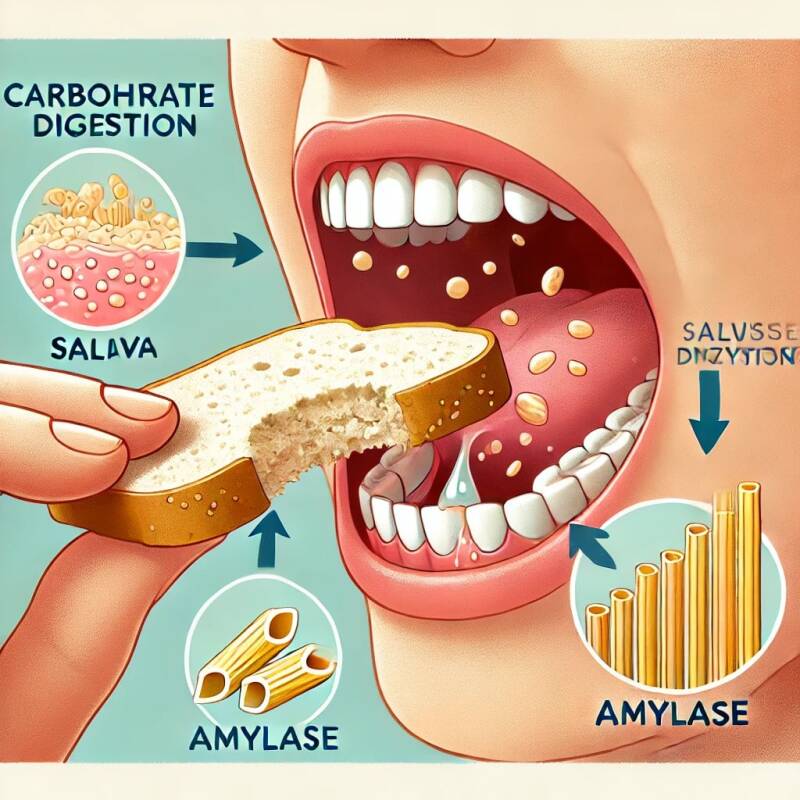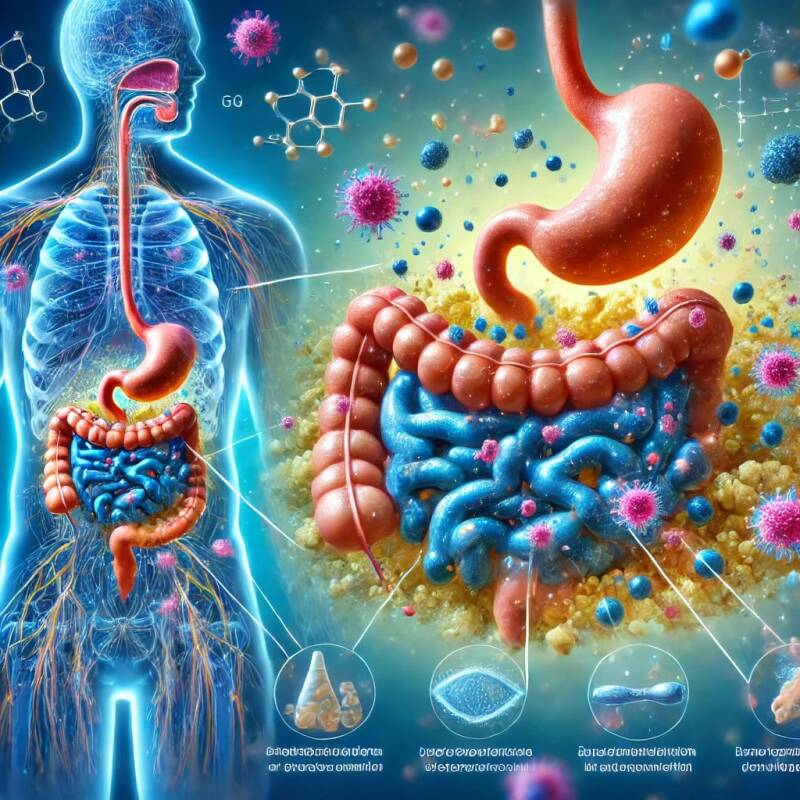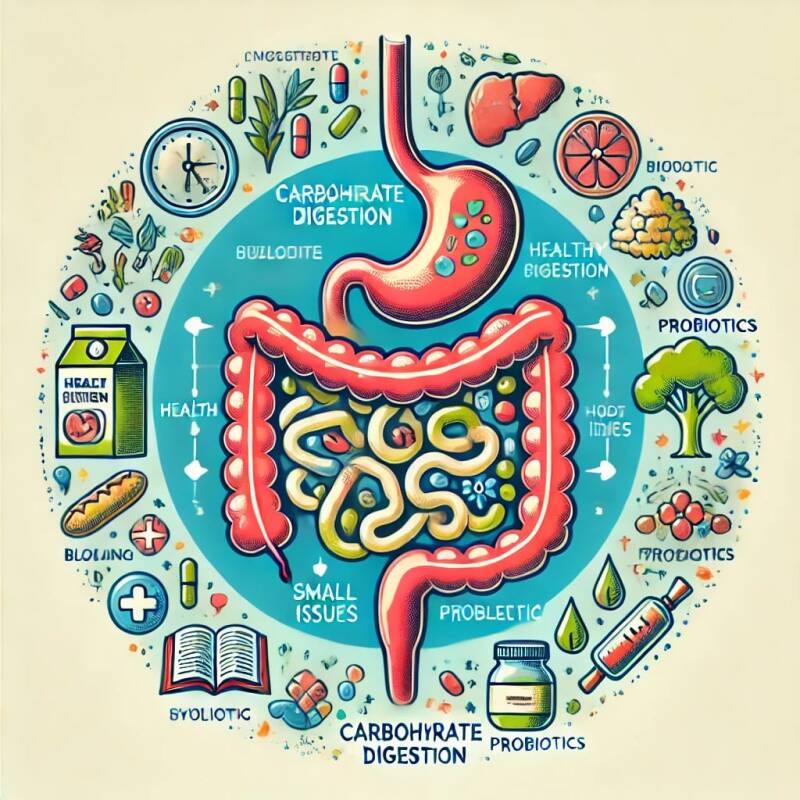Have you ever wondered what happens to the carbs in your favorite meal once it hits your stomach? While your stomach is busy breaking down proteins and fats, carbohydrates take a different route.
Let's unravel this mystery and find out why carbs aren't digested in the stomach.
Picture this: You’ve just enjoyed a hearty pasta dinner. Your stomach churns away, but surprisingly, it’s not breaking down the carbs.
To understand why, we need a bit of background on how digestion works.

You might be thinking, “If my stomach isn’t digesting carbs, where does it happen?”
Hold that thought, because we’re about to dive into the fascinating journey of carbohydrates through your digestive system.
Here’s the big reveal: Carbohydrates begin their digestion in the mouth and complete it in the small intestine.
Let’s break down this process step-by-step to see why the stomach takes a backseat in carb digestion.
Understanding Carbohydrate Digestion
What are Carbohydrates?
Carbohydrates are one of the three essential macronutrients, alongside proteins and fats. They are composed of sugar molecules bonded together.
These molecules provide energy to our bodies. Carbohydrates can be classified into two main types: simple and complex.
Types of Carbohydrates: Simple vs. Complex
- Simple Carbohydrates: These include glucose, fructose, and sucrose, which are found in fruits, vegetables, and table sugar. Simple carbs are composed of one or two sugar molecules, making them quick to digest and a rapid source of energy.
- Complex Carbohydrates: These include starches and fibers found in grains, legumes, and vegetables. Complex carbs consist of longer chains of sugar molecules, which take longer to break down, providing a more sustained energy release.
The Role of Carbohydrates in the Body
Carbohydrates serve as the body's primary source of energy. When consumed, they are broken down into glucose, which is used by cells for energy. Any excess glucose is stored in the liver and muscles for later use.
This storage form of glucose is known as glycogen.
Fun Fact: The brain relies almost entirely on glucose for its energy needs, which is why low blood sugar levels can affect your concentration and mood.
Why Carbohydrates are Essential
- Energy Production: Carbohydrates are the quickest source of energy, fueling physical activities and maintaining bodily functions.
- Brain Function: As the primary energy source for the brain, adequate carbohydrate intake supports cognitive functions.
- Sparing Protein: By providing an energy source, carbohydrates prevent the body from breaking down proteins for energy, allowing proteins to be used for growth and repair.
- Digestive Health: Fiber, a type of complex carbohydrate, aids in digestive health by adding bulk to stools and preventing constipation.
The Digestive System Overview
The Journey of Food Through the Digestive Tract
The digestive process is a complex journey that food undergoes from ingestion to elimination.
It begins in the mouth, continues through the esophagus, stomach, small intestine, and large intestine, and ends with the elimination of waste.
- Mouth: The digestive process starts here, where food is chewed and mixed with saliva.
- Esophagus: The chewed food, now called bolus, travels down the esophagus to the stomach.
- Stomach: The stomach churns the food, mixing it with digestive juices to break down proteins and fats.
- Small Intestine: This is where most of the digestion and absorption of nutrients occurs.
- Large Intestine: Water and electrolytes are absorbed, and the remaining waste is formed into stool.
Key Organs Involved in Digestion
- Mouth: Begins the process with chewing and saliva, which contains enzymes like amylase.
- Stomach: Uses acids and enzymes to break down proteins and fats but not carbohydrates.
- Small Intestine: The primary site for nutrient absorption.
- Pancreas: Produces digestive enzymes, including pancreatic amylase for carbohydrate digestion.
- Liver and Gallbladder: Produce and store bile, which helps digest fats.
Understanding the role of each organ can help clarify why the stomach is not the primary site for carbohydrate digestion.
Carbohydrate Digestion: Starting in the Mouth

The Role of Saliva and Amylase
Digestion of carbohydrates starts in the mouth. When you chew your food, saliva is mixed in. Saliva contains an enzyme called amylase, which begins the breakdown of starches into simpler sugars.
This initial process is crucial for making the carbohydrates more manageable for the rest of the digestive system.
Chewing and the Initial Breakdown of Carbohydrates
The process of chewing not only breaks food into smaller pieces, increasing its surface area but also thoroughly mixes it with saliva. This mechanical digestion is essential for effective enzymatic action.
Chewing your food properly can significantly impact how well you digest and absorb nutrients.
Why the Mouth is Crucial for Carbohydrate Digestion
The mouth’s role in carbohydrate digestion sets the stage for the entire digestive process. If carbohydrates were not partially broken down in the mouth, the small intestine would have to work much harder, which could lead to inefficiencies and digestive discomfort.
Why the Stomach Doesn't Digest Carbohydrates
The Acidic Environment of the Stomach
The stomach’s environment is highly acidic, with a pH ranging from 1.5 to 3.5. This acidic condition is optimal for the enzymes that break down proteins (like pepsin) but is unsuitable for amylase, the enzyme that digests carbohydrates.
The low pH denatures (deactivates) amylase, stopping carbohydrate digestion in the stomach.
Enzymes Present in the Stomach and Their Functions
The stomach contains enzymes such as pepsin and gastric lipase, which break down proteins and fats, respectively. However, it lacks enzymes that can break down carbohydrates effectively.
Why Amylase is Inactive in the Stomach
As soon as food enters the stomach, the acidic environment quickly deactivates salivary amylase. This means that the stomach's role in carbohydrate digestion is minimal.
The bulk of carbohydrate digestion is deferred to the small intestine, where the environment is more favorable.
Next, we'll dive into how carbohydrate digestion resumes in the small intestine and the critical roles that enzymes and the pancreas play in this process.
Carbohydrate Digestion in the Small Intestine
The Role of the Pancreas and Pancreatic Amylase
Once the partially digested food (now called chyme) leaves the stomach and enters the small intestine, the pancreas springs into action. The pancreas releases digestive enzymes, including pancreatic amylase, into the small intestine.
Pancreatic amylase continues the job that salivary amylase started by breaking down complex carbohydrates into simple sugars.
Fact: The pancreas also produces bicarbonate, which neutralizes the stomach acid in the chyme, creating a more alkaline environment in the small intestine where digestive enzymes can function optimally.
Breakdown of Complex Carbohydrates into Simple Sugars
In the small intestine, complex carbohydrates are broken down into their simplest forms: monosaccharides (like glucose, fructose, and galactose).
This breakdown is facilitated by enzymes such as maltase, sucrase, and lactase, which are produced by the cells lining the small intestine.
Key Enzymes in Carbohydrate Digestion
| Product | Price | |
|---|---|---|
| Salivary Amylase | Salivary Glands | Breaks down starches into maltose in the mouth. |
| Pancreatic Amylase | Pancreas | Continues starch breakdown in the small intestine. |
| Maltase | Small Intestine | Converts maltose into two glucose molecules. |
| Sucrase | Small Intestine | Breaks down sucrose into glucose and fructose. |
| Lactase | Small Intestine | Converts lactose into glucose and galactose. |
Absorption of Simple Sugars into the Bloodstream
Once broken down into monosaccharides, these simple sugars are absorbed by the cells lining the small intestine. They then enter the bloodstream, where they are transported to various cells in the body to be used for energy.
The liver plays a crucial role in this process by regulating blood sugar levels and storing excess glucose as glycogen.
The Importance of Enzyme Activity
Enzymes play a pivotal role in ensuring that carbohydrates are broken down and absorbed efficiently. Each enzyme is specialized to act on specific types of carbohydrate bonds in different parts of the digestive system.
This specialization ensures that the digestive process is efficient and that the body can utilize the nutrients effectively.

Enzymes Involved in Carbohydrate Digestion
Various enzymes work together to ensure carbohydrates are digested efficiently. The major enzymes include:
- Salivary Amylase: Starts the breakdown of starches in the mouth.
- Pancreatic Amylase: Continues starch breakdown in the small intestine.
- Maltase, Sucrase, and Lactase: Break down disaccharides into monosaccharides in the small intestine.
How Different Enzymes Function in Various Parts of the Digestive System
Each part of the digestive system has enzymes tailored to its specific environment and function. For example, salivary amylase works best in the slightly alkaline environment of the mouth, while pancreatic amylase operates in the neutral to slightly alkaline conditions of the small intestine.
The Importance of Proper Enzyme Function for Overall Health
Efficient enzyme activity is crucial for optimal digestion and nutrient absorption. When enzyme function is compromised, it can lead to digestive issues such as bloating, gas, and nutrient deficiencies.
Ensuring that your body produces enough digestive enzymes is essential for maintaining good digestive health.
Common Misconceptions About Carbohydrate Digestion
Myths vs. Facts About Digestion
There are several myths about carbohydrate digestion that need to be debunked:
- Myth: The stomach digests all types of food.
- Fact: The stomach primarily digests proteins and fats, while carbohydrates are mainly digested in the mouth and small intestine.
The Misconception That All Digestion Happens in the Stomach
Many people believe that the stomach is the main site for all digestion. In reality, the stomach's role is limited to breaking down proteins and fats. The small intestine is where most nutrient absorption occurs, including carbohydrates.
Understanding the Entire Digestive Process
Recognizing the role of each organ in the digestive system helps us understand why certain foods cause specific digestive symptoms.
For instance, if you experience bloating after eating carbohydrates, it could be due to how they are processed in your small intestine rather than your stomach.
Next, we will explore dietary considerations for optimal carbohydrate digestion, and how to manage digestive health effectively.
Dietary Considerations for Optimal Carbohydrate Digestion
Foods That Aid Carbohydrate Digestion
Certain foods can enhance carbohydrate digestion by providing essential enzymes and nutrients. Incorporating these foods into your diet can help ensure that your digestive system functions smoothly:
- Fruits: Pineapple and papaya are rich in natural digestive enzymes.
- Fermented Foods: Yogurt, kefir, and sauerkraut contain probiotics that support gut health.
- Whole Grains: Brown rice, quinoa, and oats provide fiber, which aids in digestion.
- Legumes: Beans and lentils are excellent sources of fiber and protein.
- Vegetables: Leafy greens like spinach and kale, as well as cruciferous vegetables like broccoli and Brussels sprouts, offer both fiber and essential vitamins.
The Importance of a Balanced Diet
A balanced diet that includes a variety of macronutrients (carbohydrates, proteins, and fats) and micronutrients (vitamins and minerals) is crucial for maintaining optimal digestive health.
By ensuring that you get a diverse range of nutrients, you support all aspects of your digestive system and overall health.
List: Key Components of a Balanced Diet
- Carbohydrates: Provide energy and fiber.
- Proteins: Essential for growth, repair, and enzyme production.
- Fats: Necessary for hormone production and nutrient absorption.
- Vitamins and Minerals: Support various bodily functions, including enzyme activity.
Tips for Improving Digestion
To optimize carbohydrate digestion and overall digestive health, consider these practical tips:
- Chew Food Thoroughly: Proper chewing increases the surface area of food, making it easier for enzymes to break it down.
- Stay Hydrated: Water helps dissolve nutrients and fiber, making it easier for your digestive system to process food.
- Avoid Overeating: Large meals can overwhelm your digestive system. Smaller, more frequent meals are easier to handle.
- Include Probiotics: Probiotics help maintain a healthy balance of gut bacteria, which is crucial for digestion.
- Limit Processed Foods: Processed foods often lack fiber and essential nutrients, making them harder to digest.
Health Implications of Carbohydrate Digestion
Issues with Carbohydrate Malabsorption
Carbohydrate malabsorption occurs when the small intestine cannot properly break down and absorb certain carbohydrates. This can lead to digestive symptoms such as bloating, gas, diarrhea, and abdominal pain.
Conditions like lactose intolerance and fructose malabsorption are common forms of carbohydrate malabsorption.

Conditions Like Lactose Intolerance and Celiac Disease
- Lactose Intolerance: A deficiency in lactase, the enzyme that breaks down lactose, leads to symptoms when consuming dairy products. This condition affects about 65% of the global population.
- Celiac Disease: An autoimmune disorder where ingestion of gluten (a protein found in wheat, barley, and rye) leads to damage in the small intestine. This damage impairs the absorption of nutrients, including carbohydrates.
How to Manage Digestive Health
Managing digestive health involves making dietary and lifestyle changes that support efficient digestion. Here are some strategies:
- Identify and Avoid Trigger Foods: Keeping a food diary can help identify foods that cause digestive issues.
- Consider Enzyme Supplements: For those with enzyme deficiencies, supplements can aid in digestion.
- Adopt a Healthy Lifestyle: Regular exercise, stress management, and adequate sleep are crucial for maintaining digestive health.
- Consult a Healthcare Provider: If you experience persistent digestive issues, seek professional advice to identify and manage underlying conditions.
Frequently Asked Questions (FAQs)
Can you feel carbohydrates being digested?
Generally, you don’t feel the specific process of carbohydrate digestion.
However, you might notice the effects, such as an increase in energy levels after eating or digestive discomfort if you have malabsorption issues.
Why do some carbs cause bloating?
Certain carbohydrates, especially those that are poorly absorbed in the small intestine, can ferment in the gut, producing gas and causing bloating.
This is common with high-FODMAP foods, which include certain fruits, vegetables, and grains.
How long does it take to digest carbohydrates?
Simple carbohydrates are digested quickly, within 1-2 hours, providing a rapid source of energy.
Complex carbohydrates take longer to break down, often several hours, leading to a more sustained release of energy.
What are the best carbs for digestion?
Whole grains, fruits, and vegetables are excellent sources of easily digestible carbohydrates.
They provide fiber, which aids in digestion and helps maintain a healthy gut.
How can I improve my carbohydrate digestion?
Eat slowly, chew thoroughly, stay hydrated, and include digestive enzymes in your diet.
Avoid foods that cause discomfort and consider probiotics to support gut health.
Are there medical conditions that affect carbohydrate digestion?
Yes, conditions like irritable bowel syndrome (IBS), small intestinal bacterial overgrowth (SIBO), and celiac disease can impact carbohydrate digestion.
These conditions often require specific dietary adjustments and medical management.
Do certain foods slow down carbohydrate digestion?
Foods high in fiber or fat can slow down the digestion of carbohydrates, leading to a slower release of glucose into the bloodstream.
This can be beneficial for maintaining stable blood sugar levels.
How do fiber and carbohydrates interact in digestion?
Fiber helps regulate the digestion of carbohydrates by slowing down the process, which can prevent blood sugar spikes and aid in overall digestive health.
Soluble fiber, in particular, forms a gel-like substance that can help improve the absorption of nutrients.
Conclusion
Summarize the Key Points
Carbohydrates are not digested in the stomach due to its acidic environment and lack of appropriate enzymes. Digestion of carbs starts in the mouth and is completed in the small intestine.
Understanding this process can help you make better dietary choices and improve digestive health.
Knowing where and how carbs are digested can help you manage your energy levels and digestive comfort. This knowledge is crucial for making informed dietary choices and maintaining overall health.
By choosing the right foods and eating habits, you can support efficient carbohydrate digestion and overall wellness. A balanced diet, regular exercise, and stress management are key components of good digestive health.
If you enjoyed learning about carbohydrate digestion, please visit for more insightful articles on Myth and Misconception. Also you may leave your comment below.
Sucks out 1.3 lbs. per day?
Ivy League researchers are stunned…
Because when overweight folks ate THIS unusual "dessert" food each morning…
They dropped an average of 1.3 lbs. each and every day!
One woman even lost 9 lbs. in just the first week…
And all they did was eat this odd "dessert" food before breakfast. Folks are seeing life-changing results – FAST.
This unusual "dessert" food is helping men and women easily shed pounds of fat, cut cravings, and hit their goal weight almost effortlessly…







Add comment
Comments